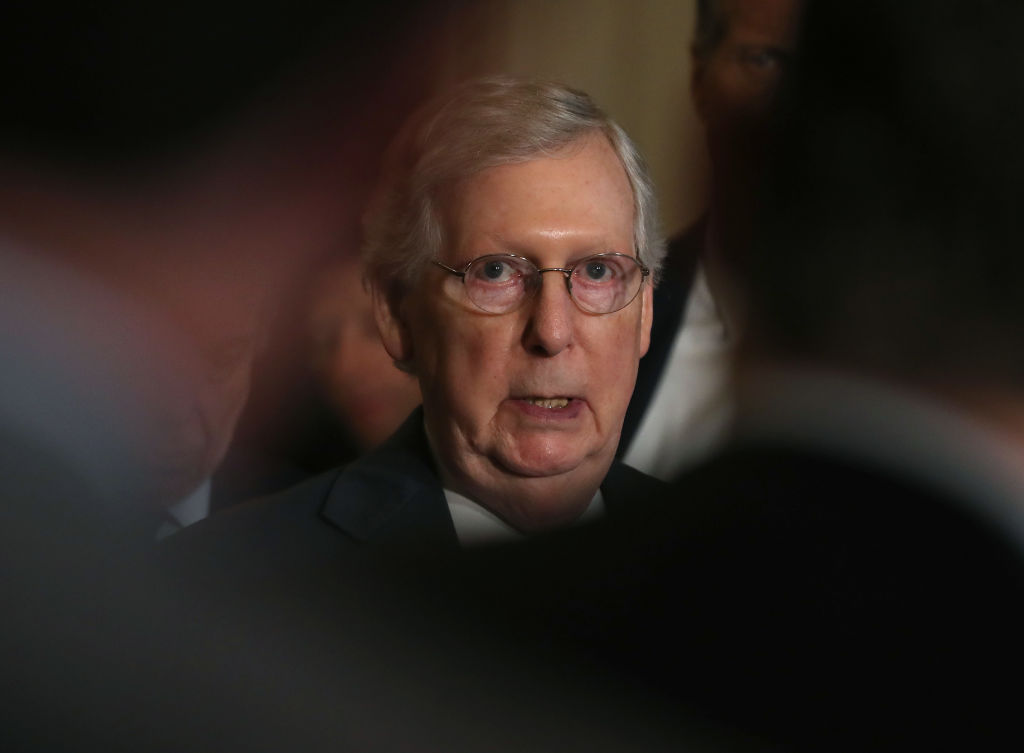Mitch McConnell blocked 2 election security bills in the warning-packed 36 hours since Mueller's testimony


A free daily email with the biggest news stories of the day – and the best features from TheWeek.com
You are now subscribed
Your newsletter sign-up was successful
In the past 36 hours, former Special Counsel Robert Mueller emphasized that Russia is still working diligently to meddle in U.S. elections, FBI Director Christopher Wray warned that Russia and other foreign adversaries are finding new ways to exploit U.S. election vulnerabilities, and the Senate Intelligence Committee released a bipartisan report that found Russia had targeted all 50 states in 2016 and "top election vulnerabilities remained" in the 2018 elections and continue to this day, though progress has been made.
In those same 36 hours, Senate Majority Leader Mitch McConnell (R-Ky.) has blocked two bills to shore up election security, one already passed by the House, calling them unnecessary reactions to a partisan Russia election meddling "conspiracy theory."
McConnell, who also blocked an election security bill ahead of the 2018 elections, argued that the federal government is doing and spending enough to ensure election security. Senate Minority Leader Chuck Schumer (D-N.Y.) called congressional inaction a "disgrace" and slammed McConnell, reminding him of Mueller's warning that Russia is interfering in the 2020 election "as we sit here." Other Democrats were similarly critical of McConnell, notably Sen. Ron Wyden (Ore.), who wrote a Senate Intelligence Committee minority report urging more action.
The Week
Escape your echo chamber. Get the facts behind the news, plus analysis from multiple perspectives.

Sign up for The Week's Free Newsletters
From our morning news briefing to a weekly Good News Newsletter, get the best of The Week delivered directly to your inbox.
From our morning news briefing to a weekly Good News Newsletter, get the best of The Week delivered directly to your inbox.
But not only Wyden.
The Senate Intelligence Committee encouraged states, which run elections, to "take urgent steps to replace outdated and vulnerable voting systems," specifically those with outdated software and the thousands of local election jurisdictions using machines that don't leave a paper trail to audit votes. "More money may be needed," the committee advised. Even if Congress acted now, it's not clear states could make the recommended substantial upgrades before the 2020 election, much less primary voting that begins in six months.
A free daily email with the biggest news stories of the day – and the best features from TheWeek.com
Peter has worked as a news and culture writer and editor at The Week since the site's launch in 2008. He covers politics, world affairs, religion and cultural currents. His journalism career began as a copy editor at a financial newswire and has included editorial positions at The New York Times Magazine, Facts on File, and Oregon State University.
-
 The broken water companies failing England and Wales
The broken water companies failing England and WalesExplainer With rising bills, deteriorating river health and a lack of investment, regulators face an uphill battle to stabilise the industry
-
 A thrilling foodie city in northern Japan
A thrilling foodie city in northern JapanThe Week Recommends The food scene here is ‘unspoilt’ and ‘fun’
-
 Are AI bots conspiring against us?
Are AI bots conspiring against us?Talking Point Moltbook, the AI social network where humans are banned, may be the tip of the iceberg
-
 Judge blocks Hegseth from punishing Kelly over video
Judge blocks Hegseth from punishing Kelly over videoSpeed Read Defense Secretary Pete Hegseth pushed for the senator to be demoted over a video in which he reminds military officials they should refuse illegal orders
-
 Trump’s EPA kills legal basis for federal climate policy
Trump’s EPA kills legal basis for federal climate policySpeed Read The government’s authority to regulate several planet-warming pollutants has been repealed
-
 House votes to end Trump’s Canada tariffs
House votes to end Trump’s Canada tariffsSpeed Read Six Republicans joined with Democrats to repeal the president’s tariffs
-
 Bondi, Democrats clash over Epstein in hearing
Bondi, Democrats clash over Epstein in hearingSpeed Read Attorney General Pam Bondi ignored survivors of convicted sex offender Jeffrey Epstein and demanded that Democrats apologize to Trump
-
 El Paso airspace closure tied to FAA-Pentagon standoff
El Paso airspace closure tied to FAA-Pentagon standoffSpeed Read The closure in the Texas border city stemmed from disagreements between the Federal Aviation Administration and Pentagon officials over drone-related tests
-
 Judge blocks Trump suit for Michigan voter rolls
Judge blocks Trump suit for Michigan voter rollsSpeed Read A Trump-appointed federal judge rejected the administration’s demand for voters’ personal data
-
 US to send 200 troops to Nigeria to train army
US to send 200 troops to Nigeria to train armySpeed Read Trump has accused the West African government of failing to protect Christians from terrorist attacks
-
 Grand jury rejects charging 6 Democrats for ‘orders’ video
Grand jury rejects charging 6 Democrats for ‘orders’ videoSpeed Read The jury refused to indict Democratic lawmakers for a video in which they urged military members to resist illegal orders
